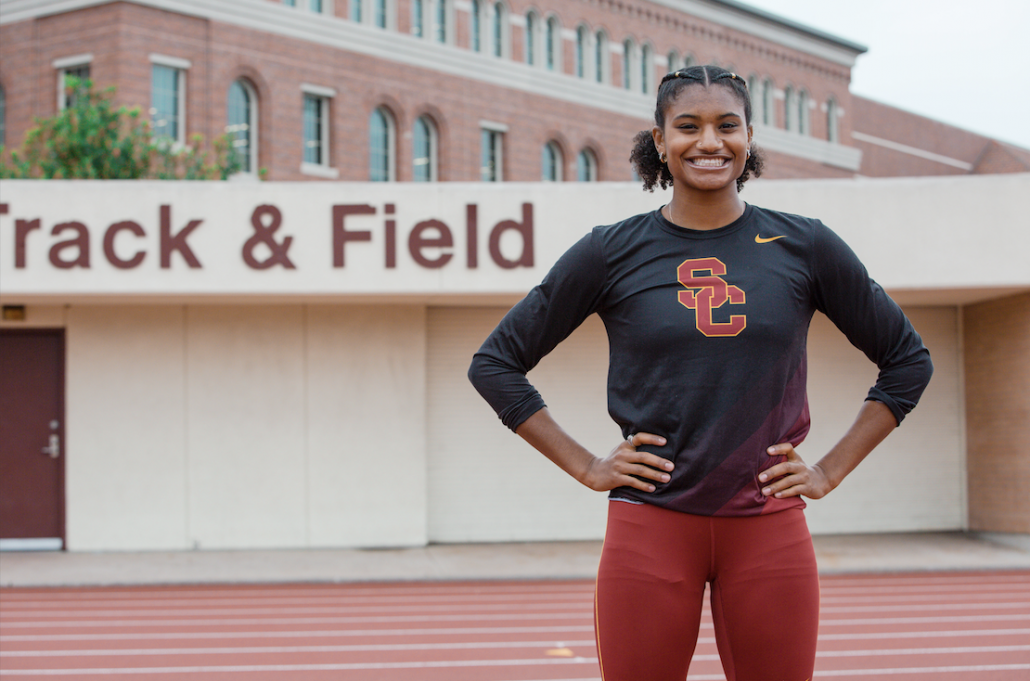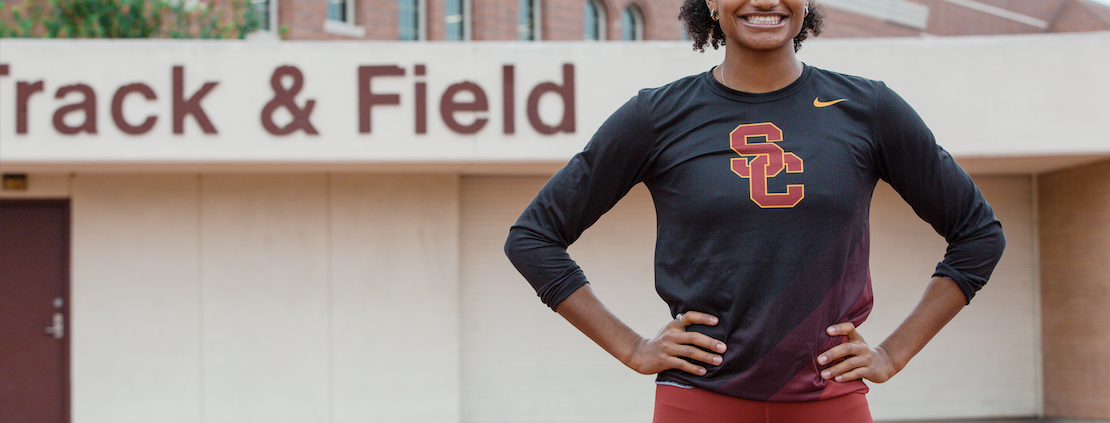Anna Cockrell runs the world

The national anthem echoes throughout the stadium as athletes line up to race. For junior Anna Cockrell, standing still before she’s about to run is never an option. Instead, she showcases another equally impressive talent that hasn’t yet won her a world championship — singing.
“If the national anthem plays, I’m going to sing along,” Cockrell said. “What do you want me to do? Just stand there?”
She was born with a powerful voice that her high energy and extroverted nature won’t silence.
As a hurdler and relay runner for the USC women’s indoor and outdoor track and field team, Cockrell is a proven champion and leader. But she has only continued to demand more of herself.
Growing up
Cockrell was born in San Francisco and spent her childhood moving between North Carolina, Maryland and Michigan, before settling down for high school in Waxhaw, North Carolina. Throughout all the moving around, one part of the Cockrell family remained constant: an emphasis on education.
Their dinner placemats had the presidents of the United States and state capitals listed, and bedtime consisted of prayer and an educational component, like teaching the kids to spell their names. As they grew older, watching “Meet the Press” and “60 Minutes” every Sunday was a Cockrell family tradition, and Anna took naturally to politics. At 10 years old, she was a faithful reader of the Wall Street Journal.
“It was just to always be aware of what’s going on in your country and how laws and what happens in politics determines what happens in the world,” Cockrell’s mother Serena said. “The more aware you are of what’s going on, the better decisions you can make.”
Cockrell read anything and everything she could, from books to online articles. The three Cockrell children would sit at the kitchen table and do homework every night, and even as the youngest sibling, Cockrell knew everyone’s answers. Her older brother and eventual Duke University graduate, Ross, would ask her the definitions of words and consult her on comma placements.
“She was a walking encyclopedia,” Serena said.
Despite constantly reading, Cockrell was always more of an auditory learner, picking up piano by ear and only fooling her parents into thinking she could read sheet music. She thrived in voice lessons, devoted time to musical theatre and even studied classical semi-operatic Italian music for a short time.
And she was just as physically active as she was mentally, always running around and never sitting still.
“She’s the bulldozer in the family with the biggest heart,” Serena said.
At first, people might not recognize the truth in this paradox, but to anyone who spends time with Cockrell, it’s obvious.
“She can come across as tough, but she really is very soft inside,” Cockrell’s father Keith said without hesitation. “She might seem intimidating because of her stature and her performance in the classroom and on the track, but the reality is she has the biggest heart imaginable.”
Competing for USA
Cockrell’s foundation in education translated well into her athletic career. According to her high school coach and now-close friend Carol Lawrence, the desire to learn separates Cockrell from other athletes.
“She’s one of those persons that’s a student of her event,” Lawrence said. “She doesn’t just go and do, she actually learns what she needs to do to get better at that event. She’ll study her own skill and she’ll study other people just to get that one fix to make herself a little bit better.”
Lawrence felt like she could push Cockrell all the way to the world stage.
“She was one of the few persons I’ve ever coached that, if I tell her what I’d like, she would look at [me] deeply, and [I] can see the wheels turning,” Lawrence said. “She will analyze everything you tell her, and she would fix it right there and then.”
This led Cockrell onto the USA Under-20 team in 2016, where she won the world championship for 400-meter hurdles in Poland.
“[Lawrence] just had a huge vision for what she wanted me to do,” Cockrell said. “It wasn’t good enough to be a state champion, wasn’t good enough to be a national champion. As soon as I got with her my freshman year, we were going for USA teams.”
The national team was carefully composed of women all over the country, some who had competed against Cockrell and others she had never met. But that didn’t stop her natural leadership skills from shining through. Cockrell’s loud voice, kind personality and undeniably contagious smile broke the awkward silence among the new group. She introduced herself to anyone she hadn’t known and made a point to have dinner with the long-distance runners. She made people feel comfortable, a trait that would earn her captain honors of the USA world championship team and eventually USC’s national title team.
Cockrell is unapologetic about her dominant personality — she knows she can apply it positively.
“I just don’t do well being quiet,” Cockrell said.
Training as a Trojan
In her first 400-meter hurdle competition for USC, Cockrell took the fourth spot on the school’s all-time list and set a freshman school record. She set another freshman school record for 60-meter hurdles in the NCAA championships at the end of the year and took second in 400-meter hurdles, finishing the season with Pac-12 Women’s Freshman of the Year and All-American honors.
She decorated her sophomore year with an indoor national championship — a feat barely accomplished but nonetheless entirely deserved.
“It was the most emotional three days of life — ever,” Cockrell emphasized.
She competed in 100-meter hurdles, 400-meter hurdles and 4×400-meter relay. With four athletes in the 100-meter hurdles, USC expected to advance two runners into the finals, if not all four. But none of them made it past the first day.
From that moment, everything seemed to fall apart. Their opportunities for points were limited from the start, and they had worked out what would need to happen to win it all, but it just didn’t seem feasible at that point. Until Mady Richards, now graduated, swung the momentum in the Trojans’ favor by placing in long jump and surprising those who had calculated the possible outcomes.
At the end of the third day, the 2018 women’s outdoor national title came down to one race: the 4×400-meter relay.
“We knew we were hands down the best team out there,” Cockrell said. “It was going to be a fight, but we knew if we could all just do our job … we were going to be fine.”
USC’s competition had strategically stacked their fastest runners early to build a lead that would be impossible for sprinter Kendall Ellis, who graduated in 2018, to overcome in the last leg of the race. Cockrell received the baton from current junior Kyra Constantine before running her best leg all season. With a solid hand-off to sprinter Deanna Hill, Cockrell collapsed onto the grass, confident that they had clinched it based off Hill’s positioning.
But before she could start celebrating, Hill and Ellis bobbled the baton in the hand-off, putting Ellis far behind the other schools’ final leg runners. Cockrell began crying on the track as she watched the national title escape.
Until it didn’t. Through her tears, Cockwell saw Ellis make an aggressive cut on Kentucky, and she realized Ellis had a chance.
She didn’t know what would happen until mid-way through the back stretch when she was sure Ellis was about to win it. And this time, she had it right.
The three minutes, 27 seconds and 45 milliseconds of emotional chaos that it took to cross the finish line and clinch the national championship was representative of the rainy, freezing cold rollercoaster they had ridden throughout the meet.
“It was just exhausting in the best possible way,” Cockrell said. “It was really special and something I’ll never forget.”
As a junior, Cockrell is in her second season as USC’s captain. While her admirable relatability to her teammates hasn’t changed, her leadership role has shifted. Being elected captain as a sophomore was the ultimate recognition and an honor that she didn’t take lightly — for Cockrell, it meant an opportunity for growth.
“It was kind of finding the balance,” Cockrell said of her sophomore season. “Yes, I am the captain. But how do I act as a captain without going too far and without making the juniors and seniors, who have been around longer than me, [feel] uncomfortable?”
She took more of a backseat and let the tough words that needed to be said fall to the senior captains. This year, Cockrell is stepping into the role she’s accustomed to as an active and vocal leader, but she’s still working on finding a way to help her teammates acknowledge a mistake and realize it’s not the end of the world.
“Some leaders have to yell, but she doesn’t have to,” sophomore hurdler and sprinter Chanel Brissett said. “She’ll pull you to the side and have a conversation with you, and you’ll get what she says.”
When she’s not singing and clapping to pump her teammates up, Cockrell thinks about her intersectional identity as a woman of color and athlete at USC. She makes a point to attend other women’s athletic events on campus and talk to female athletes about their season and training.
“I want all women’s sports to get their due, to get coverage, respect [and] monetary compensation,” Cockrell said. “I don’t know how I’m able to affect that at this point, but [I’m] just putting myself out there, expressing my ideas and lifting up my teammates and other women.”
Future feats
Cockrell’s interest in politics never wavered throughout high school, where she participated in Get Out the Vote initiatives and voter registration drives, inspiring her to become a communication major and political science minor at USC. She discovered more about the field when she volunteered on Sen. Dianne Feinstein’s re-election campaign and Marshall Tuck’s campaign for California state superintendent.
“I like interacting with people,” Cockrell said. “It’s kind of annoying to call people and be in peoples’ face, but it’s fun at the same time.”
Even though Cockrell matriculated at USC with dreams of becoming the next Rachel Maddow, she decided to take her planning and people skills into forward-facing politics where she can interact with both candidates and constituents.
“If I need to talk about anything politics with [Anna], I need to do research first,” Lawrence said. “I have to do research on any topic before I mention anything to her, because she is so sharp that it’s scary. She’s so intellectual.”
After finishing her bachelor’s degree this semester, she will go on to graduate school in the Price School for Public Policy, finishing out her collegiate track career with one more year before, ideally, running professionally.
“I’m at the point where I really want to listen to my body and run for as long as it makes sense and it makes me happy,” Cockrell said. “We’ll see what my body and my mind want to do.”
Cockrell hopes for the fairytale ending — running in three Olympics and calling it a career when the Games return to L.A. in 2028. Judging by her track record in achieving goals, 2028 seems entirely possible.
“Anna’s one of the most disciplined people that you’ll come across,” Keith said. “To this day, she writes her goals on a whiteboard at the start of every year.”
After making some money on the circuit, she wants to retire her athletic career and work in politics. Even when Cockrell’s muscles have been overworked and given out, her warmth, kindness and dominant voice will carry her strengths to new fields and heights.
“She has all the time in the world,” Lawrence said. “There’s so much more to her life right now than just track.”

